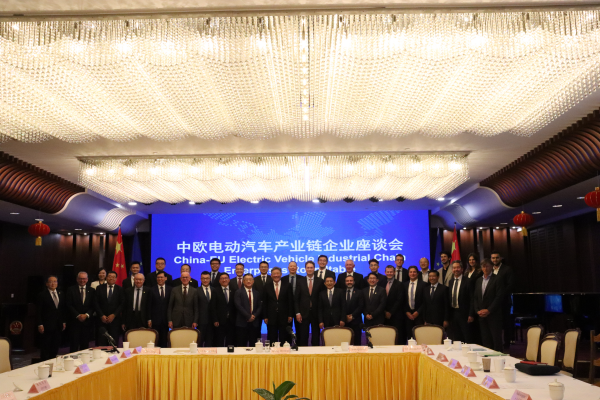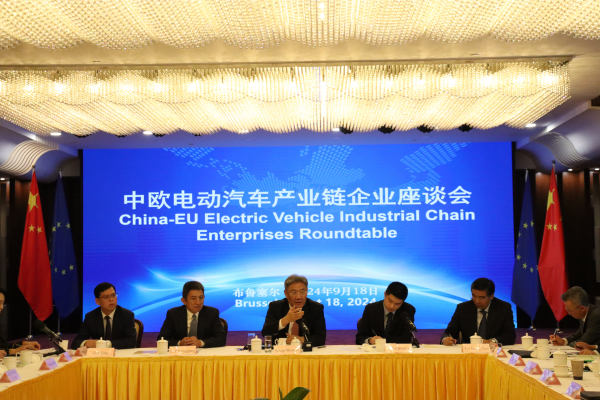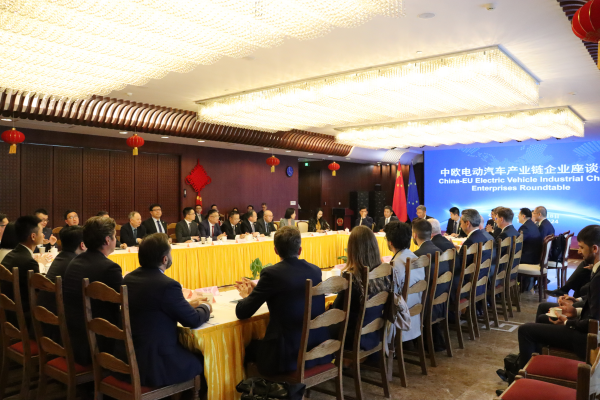Chinese Minister of Commerce Wang Wentao: China Will Remain Committed to EV Negotiations "Until the Final Moment"
"China-Europe Electric Vehicle (EV) Industrial Chain Enterprises Roundtable" Held in Brussels
Chinese and European Automakers Urge Dialogue to Address EU's Anti-Subsidy Investigation into Chinese Evs
On September 18, 2024, during his visit to Belgium, Chinese Minister of Commerce Wang Wentao presided over the "China-Europe Electric Vehicle (EV) Industrial Chain Enterprises Roundtable" in Brussels. The meeting was attended by approximately 30 companies and industry associations from the electric vehicle sectors in both China and Europe, including the China Chamber of Commerce to the EU (CCCEU), the China Chamber of Commerce for Import & Export of Machinery & Electronic Products (CCCME), as well as representatives from SAIC, BYD, CATL, Volkswagen, Mercedes-Benz, and BMW.

At the roundtable, participants from the China-Europe EV industrial chain expressed their hope that both sides would engage in dialogue and consultation to find a mutually acceptable solution. EV companies from China and Europe voiced their opposition to the potential imposition of additional EU tariffs and called for both parties to make use of the current "critical time window" to resolve trade frictions through constructive dialogue and negotiation.
Minister Wang noted that the negotiations on EV-related issues between China and the EU should by no means proceed without hearing the voices of both Chinese and European businesses. He explained that the roundtable, ahead of his discussions with the EU side, was intended to listen to the concerns and recommendations of EV companies on both sides.
"The Chinese side has come here in good faith and will certainly persevere until the final moments of the consultations. If the consultations fail, the responsibility does not lie with the Chinese side," the minister added.

During the meeting, some European automakers mentioned that the European EV industry boasts global competitive edges, "does not fear competition and does not require protectionist measures." Minister Wang concurred, pointing out that certain countries had competed to impose excessively high tariffs on Chinese EVs, a practice he described as "bullying." He emphasized that both the EU and China are staunch defenders of the multilateral trading system. "I insisted on coming here for consultations because I firmly believe that the EU will uphold the rules," he remarked.

Minister Wang also underscored that this year marks the 40th anniversary of China-Europe automotive cooperation. He highlighted that China has always provided a fair and competitive environment for European automakers, and that the automotive markets of China and Europe have long been closely interconnected, with cooperation being the foundation of their relationship. "It is hoped that the European market will provide the same level playing field for Chinese car companies," he noted.
The minister continued to warn that punitive tariffs on Chinese EVs by the EU would also negatively impact European companies' production in China and their exports back to Europe. China and the EU now stand at a "crossroads" in their industrial cooperation—one path leading to openness and collaboration while the other to protectionism and isolation, he said, adding that China would keep its doors open for cooperation and expressing the hope that other countries would refrain from closing doors to Chinese industries.
He further stated that subsidies and industrial policies are challenges faced by all countries, and that differences in interpretation should be resolved within the framework of the World Trade Organization (WTO), rather than through the adoption of trade protectionist measures. He called on businesses from both China and Europe to make their voices heard at this crucial juncture, urging both sides to work towards a constructive resolution to the EV anti-subsidy investigation and to prevent an escalation of trade tensions.
At the roundtable, more than 10 Chinese and European companies and industry associations shared their views on the EU's investigation into Chinese EVs. Some Chinese car companies have re-emphasised the discriminatory treatment they have suffered in this case and the inappropriate method of calculating subsidies and called on the Chinese government to safeguard their interests. Some participants suggested that China consider imposing tariffs on the EU's large-engine vehicles.
Additionally, certain Chinese companies noted that if the EU proceeds with the imposition of additional tariffs, their existing investment plans would have to be re-evaluated as their confidence in the EU's investment environment would be diminished. They emphasized that Europe remains a critical overseas market for Chinese automakers and expressed hopes for greater technological and market cooperation between the two sides.
European car companies and industry associations said that the automotive industry is a global industry, and the interests of Chinese and European companies are deeply intertwined. If the European Commission takes measures, it will not only hurt Chinese enterprises, but also European enterprises. Protection will not lead to technological progress and competitiveness enhancement. "We support free trade and market opening and oppose protectionist measures."
Both Chinese and European automakers reiterated their hope that the EU would refrain from imposing anti-subsidy tariffs on Chinese EVs and called for the swift resolution of mutual concerns through dialogue and consultation.
Li Chenggang, China's Ambassador to the WTO, Fei Shengchao, China's Ambassador to Belgium, and Zhu Jing, Chargé d'affaires a.i. of the Chinese Mission to the EU, also attended the roundtable.

 Login
Login Login
Login CCCEU and Gunnercooke Successfully Host Webinar on CSDDD and FLR Compliance to Guide Chinese Businesses
CCCEU and Gunnercooke Successfully Host Webinar on CSDDD and FLR Compliance to Guide Chinese Businesses Cultivating responsible China-EU business leaders essential to tackling global challenges
Cultivating responsible China-EU business leaders essential to tackling global challenges



